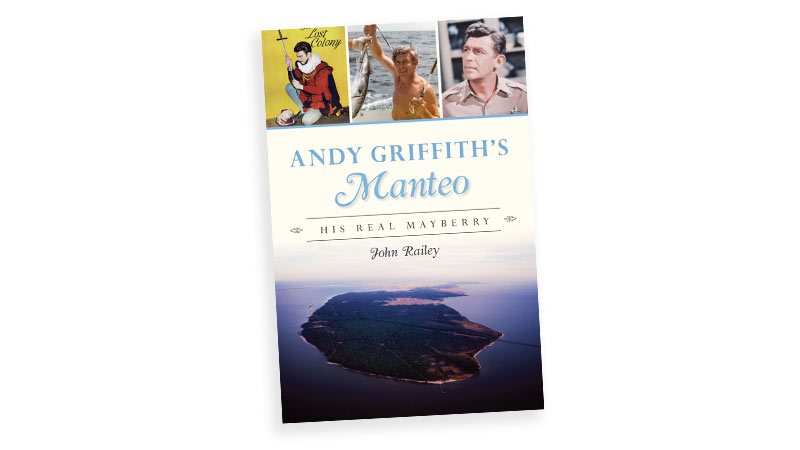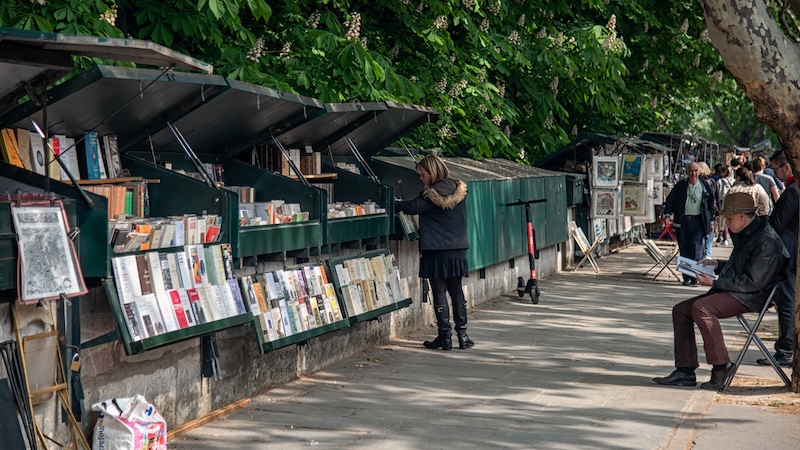‘Andy Griffith’s Manteo: His Real Mayberry’
An excerpt from the book on the star, who spent important years in the Outer Banks

The world loves Sheriff Andy Taylor. Yet the actor who played him was intensely private. Andy Griffith achieved his artistic breakthrough while acting in The Lost Colony outdoor drama on Roanoke Island, then spent much of the rest of his life repaying the island for giving him that start. Here is Andy of Manteo, reveling in wild, watery and loving ways with his fellow islanders. In Andy Griffith’s Manteo: His Real Mayberry, author and journalist John Railey paints an intimate portrait of Andy, based on interviews with many who knew him best on the sand where he lived and died.
Savor the story of Andy’s early days, from the prologue of Andy Griffith’s Manteo, then get your own copy of the book to enjoy the rest of the story.
Prologue
Nags Head, Summer 1952
The Shrine Club at Whalebone Junction
You have to remember: We knew him before he was famous.
– Della Basnight, one of Andy’s best island friends, August 2020
The wild-eyed, rail-thin foothills boy steps out on the stage. Andy Griffith, sweaty and scared, is making his first real try at comedy. He is twenty-six years old. The room is crowded and hot, electric fans and salt air drifting through the open windows the only relief. It’s edging toward midnight on a Saturday. The audience members, sunburned men in suits and loosened ties, their hair slicked back by Brylcreem and their women with bouffant hairdos in flowered dresses tight on their curves, are blowing clouds of smoke from their unfiltered cigarettes. Some are rowdy, gulping drinks poured over ice, some with mixers, some straight, from the fifths they’ve brought into the private club in brown paper bags. The scent of aftershave and perfume swirls in the air.
Andy’s on the ground floor of the two-story frame building at a junction named for a seventy-two-foot whale skeleton hauled off the beach with a Model -T Ford truck during the Great Depression and eventually placed in front of a gas station to lure in tourists.
The bones had sat there in the yellow, briar-spurred sand, bleached white by the sun, until the station burned down and someone carted the bones away, legends making way for new ones. Andy is sober, having just peeled off his Sir Walter Raleigh costume at The Lost Colony outdoor pageant across the bridge over the Croatan Sound, on Roanoke Island, and changed into street clothes, dark pants, an open-collared shirt and black leather shoes, not the bare feet he usually sports when not working.
Well, almost sober. Andy might have taken a couple of quick shots on the short ride to the Shrine Club with his pageant friend Ainslie Pryor, Andy riding shotgun in Ainslie’s station wagon because he didn’t have a car of his own. Among the pageant and island friends Andy has made, he is known for enjoying and, usually, holding his liquor. He has a contagious gap-toothed grin and zest but is serious about his work, obsessed with getting it right before he goes on stage. As Ainslie drove Andy up the Causeway, the car windows would have been down, the damp salt air pouring in, the dimming lights of the island over the Sound water in the rear-view mirror, the bright lights of Nags Head ahead, the limitless ocean beyond.
Back at his college, the University of North Carolina at Chapel Hill, after first pursuing a career as a Moravian minister, Andy decided to major in music, then started acting in the Carolina Playmakers, which funneled actors and crew to The Lost Colony.
In the pageant, Andy has honed his dramatic acting. He has been a cutup since grade school, and now he’s flirting, at least subconsciously, with the idea of becoming a professional comedian or, at least, a comedic actor. He’d always been a listener, a deceptively careful one. Andy has what the novelist James Jones, the author of From Here to Eternity, once called “this f—— ear” about the gift of loving conversations overheard and transforming them into beguiling dialogue. From the time he’d caught the ferry over to the hard-living, hard-loving Roanoke Island, Andy has been enraptured, listening closely to the stories the islanders tell in their Old English brogue and the humor that comes with it, especially those of one of his landlords in downtown Manteo, Alpheus “Alph” Drinkwater, with his corny jokes. (“Need to borrow a wheelbarrow, you say? Where you taking your girl tonight?”)
Like ‘Andy Griffith’s Manteo: His Real Mayberry’?
Check out the ‘Uncle Jack’s Outer Banks’ book
The unintended humor is even better, as in the Manteo storeowner who never has whatever item you asked for, saying, “Aw, I had that before the war” or asking the customer, “Did we used to carry that?” Andy boiled down the storeowner’s response to this: “Whatever you asked for, he ain’t got.”
Andy, fascinated by such conversations, has begun to transform them into art. He merges those stories with ones he’d heard up in Mount Airy, hundreds of miles west in the foothills of the Blue Ridge Mountains, where he’d grown up the only child of factory worker Carl Lee Griffith and Geneva Nunn Griffith. Being called “white trash” as a child cut him deep. “He came down here wounded, and he got more wounded, at first,” one of Andy’s island friends would remember.
Andy started in 1947 in a bit part, an Elizabethan soldier, and played that role the following season as well. That second season had been frustrating. He was working in the pageant with two of his best friends from college, R.G. “Bob” Armstrong and Barbara Edwards. Bob played colonist John Borden to Barbara’s Eleanor Dare. They were stars, with their characters all but falling in bed together toward the end of the play. Andy was dating Barbara, the daughter of a school superintendent from Troy, North Carolina, and, by some accounts, Bob had dated her as well, back at Carolina. That, coupled with their play status above Andy’s, hurt him. As Bob and Barbara swooned to each other on stage, Andy must have been grimacing backstage. His competitive nature was ignited.
By his third season, 1949, Andy had worked his way up to the top male role in the play, that of Sir Walter. That summer, he married Barbara in the Little Chapel adjacent to the theater grounds. She was a beautiful brunette from North Carolina’s Piedmont. Andy was healing and growing as an artist.
He and Barbara moved to Goldsboro, North Carolina, a few hours inland, where Andy taught music and was assistant drama coach at the local high school, then moved to Chapel Hill to chance it all on an across-the-state entertainment routine. They continued to return to work at the pageant each summer. At live-stage venues after The Lost Colony, Andy tried out comedy routines. It had been a long hit-and-miss process.
In the weeks before he took the stage at the Shrine Club that summer night in 1952, Andy had been working toward new routines with Ainslie and Bob. Bob, a former steel mill worker, football player and World War II vet from Alabama nine years older than Andy, is like Andy in that he is earthy and wild, but unlike Andy, book smart and a natural writer. Ainslie, a Memphis native five years older than Andy, is like what Andy might want to be, urbane and sophisticated. Ainslie had studied drama at a Memphis college, served in the Merchant Marine in World War II and was the director of the Raleigh Little Theater.
He and Andy met in Manteo when Ainslie, who had recently started in the pageant and played Eleanor’s father, Governor John White, came over to Andy and Barbara’s room one night, drunk, and sat down on the floor and told a joke. Ainslie and Andy started talking and never stopped, feeling simpatico as greenhorn artists trying to harness their talent and dreams. It’s the same with Andy and Bob.
The cast had daylight to kill before their nightly performances. They’d drive over to the Nags Head beach, Ainslie and Andy digging their toes in the sand by Jennette’s Pier, watching waves, Ainslie belting out old blues songs as Andy played guitar. Andy wove that work into skits he did at other venues on the beach, but he wanted more.
He had never written a comedic monologue. But he took that up in that summer of 1952, first trying a “To Be or Not to Be” routine, spinning off the scene from Shakespeare’s Hamlet. Andy didn’t think the routine was funny. So, on a hot afternoon in the yard outside their downtown Manteo rooms, Andy told Bob Armstrong to tell him more about Hamlet, dwelling on all the characters. Bob obliged. Andy always knows who to go to, and no one can tell him no.
More Andy Griffith-related memories:
Thelma Lou in the real Mayberry
Betty Lynn: From Mandalay to Mayberry
Keith Thibodeaux, Opie’s best friend
Andy wandered back to his room and began writing a comedic monologue about Hamlet, a country boy’s take on the play, one taking in the whole work, not just one scene. Perhaps he was influenced by playing Sir Walter, “an Englishman,” as he once put it, “with a Southern accent.” He loves standing on that stage by the water, realizing that the events that he and his fellow actors are riffing from actually took place on that sand, getting the whole feel of it. Andy had grown into being a dramatic stage presence, absorbing his role, knowing his lines, how to time them, resonate his voice and hit his marks on the stage. The role has become easy for him, maybe giving him time, even on stage, to think about the Hamlet monologue. He can be distracted. Once, he is caught on camera onstage trying to tap down his rowdy hair.
Now Andy stands on the Shrine Club stage. He is under the hot lights, and those over the audience are off for the show. Andy already knows one paradox of live entertainment: Underneath the bright lights, you can’t really see the audience out there in their darkness, maybe just the first row or so, numbing your stage fear a bit, but you know they are there and laser-focused on you, and you sure as hell want to hear their laughter. Silence is deadly. He is out there all by himself, an only child who hates to be alone.
Andy, a mic in his right hand, waves his left hand through his untamed brownish-blond hair, high on the top, short on the back and sides by his big ears. His eyes are deep-set and blue, relatively small beneath a heavy brow, intense and twinkling, going hard if he feels slighted. He smiles and begins to weave, in his foothills drawl, his act:
Now I went to see a play right here lately, it was one of them classical plays, and it was wrote by a fella named William Shakespeare that lived over here in the old country a while back. And it’s a play called Hamlet. It was named after this young boy Hamlet that appeared in the play and it was pretty good except that they don’t speak as good a English as we do. Now let’s see, Hamlet, he lived in this castle over in the old country with his mama and daddy.
Andy rolls on with the story of Hamlet’s paternal uncle Claudius killing Hamlet’s father, then taking up with Hamlet’s mother. He tells of the soldiers saying “hark, hark,” and how “they said that a lot back then” and how Hamlet “won’t all there.”
He pauses, smiling and hoping for laughs. There are a few chuckles, but nothing more. The audience is accustomed to conventional American comedy, short jokes and one-liners, not this strange long model. A few men rise from their seats and hustle their women out. Andy sees that by the exit lights and is glad that he doesn’t see his fellow cast members from The Lost Colony and island friends among the departed. He has gotten to know some of the bed-jumping islanders, fascinated by their free-loving culture, gay, straight and bisexual, stretching his mind.
He goes on with his routine, tapping into the hills storytelling with which he was raised, blending it with a narrative style he has learned on the island, tying both styles together with humor gleaned from his father and from studying the dialogues of the hill people and the islanders, seeing the world through their eyes and making the ordinary extraordinarily funny, hitting the sweet spot of not talking down to his compatriots but sharing a wink with them at the highbrows. And most of all, the stories from the islanders, coming sweet to his fine ear like lines woven from honeysuckle vines. Andy knows he must become one with his audience members, signaling to them that they are not alone in their struggles running shops and fishing boats. Their backs are against the wall, and so is his. He has tempered his anger at being looked down upon growing up, transforming it to humor that subtly celebrates working folks.
He rolls on. The laughter grows. He is not classically handsome, but something about the intensity of his eyes and his voice, somewhere between tenor and baritone, touches the audience down deep. He is country and invitingly wild and exotic all at once.
Andy realizes he has them hooked, as surely as fish on the lines of his island buddies. He carefully reels the audience in, honing his timing, waving his long arms to make points, reveling in his comedic power.
He lays the hook in hard: “It’s a pretty good show, and the moral of it is, if you was to ever kill a fella and marry his wife, I’d be right careful not to tell my stepson.”
Finally, the people in the audience cannot stop laughing. They are not laughing at him, like people did when he was a boy, but with him. He is controlling the laughter.
The audience cheers and cheers. Andy smiles and bows. Taking his first bow as Sir Walter was sweet, but this is something else again.
The audience, and the island, have just given him his start at stardom. What happened to him on that sliver of sand during his Lost Colony summers, culminating in that night, was as magic as lightning over the Sound, a cosmic kiss. He will never forget it. He will try to repay the debt.
Andy Griffith’s Manteo: His Real Mayberry by John Railey
Released May 9, 2022


